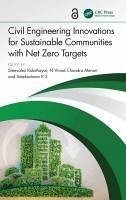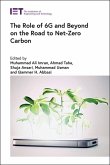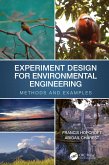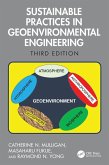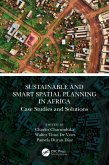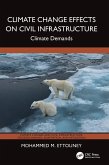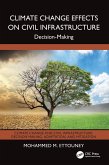Civil Engineering Innovations for Sustainable Communities with Net Zero Targets
Herausgeber: Kolathayar, Sreevalsa; K S, Sreekeshava; Chandra Menon, N Vinod
Civil Engineering Innovations for Sustainable Communities with Net Zero Targets
Herausgeber: Kolathayar, Sreevalsa; K S, Sreekeshava; Chandra Menon, N Vinod
- Gebundenes Buch
- Merkliste
- Auf die Merkliste
- Bewerten Bewerten
- Teilen
- Produkt teilen
- Produkterinnerung
- Produkterinnerung
This volume on civil engineering innovations for sustainable communities with net zero targets aligns with the United Nations sustainable development goals in the context of civil engineering innovations.
Andere Kunden interessierten sich auch für
![The Role of 6g and Beyond on the Road to Net-Zero Carbon The Role of 6g and Beyond on the Road to Net-Zero Carbon]() The Role of 6g and Beyond on the Road to Net-Zero Carbon130,99 €
The Role of 6g and Beyond on the Road to Net-Zero Carbon130,99 €![Experiment Design for Environmental Engineering Experiment Design for Environmental Engineering]() Francis J HopcroftExperiment Design for Environmental Engineering154,99 €
Francis J HopcroftExperiment Design for Environmental Engineering154,99 €![Sustainable Practices in Geoenvironmental Engineering Sustainable Practices in Geoenvironmental Engineering]() Catherine N MulliganSustainable Practices in Geoenvironmental Engineering192,99 €
Catherine N MulliganSustainable Practices in Geoenvironmental Engineering192,99 €![Sustainable and Smart Spatial Planning in Africa Sustainable and Smart Spatial Planning in Africa]() Sustainable and Smart Spatial Planning in Africa144,99 €
Sustainable and Smart Spatial Planning in Africa144,99 €![Net Zero Net Zero]() Dieter HelmNet Zero8,49 €
Dieter HelmNet Zero8,49 €![Climate Change Effects on Civil Infrastructure Climate Change Effects on Civil Infrastructure]() Mohammed M EttouneyClimate Change Effects on Civil Infrastructure173,99 €
Mohammed M EttouneyClimate Change Effects on Civil Infrastructure173,99 €![Climate Change Effects on Civil Infrastructure Climate Change Effects on Civil Infrastructure]() Mohammed M EttouneyClimate Change Effects on Civil Infrastructure174,99 €
Mohammed M EttouneyClimate Change Effects on Civil Infrastructure174,99 €-
-
-
This volume on civil engineering innovations for sustainable communities with net zero targets aligns with the United Nations sustainable development goals in the context of civil engineering innovations.
Produktdetails
- Produktdetails
- Verlag: Taylor & Francis Ltd (Sales)
- Seitenzahl: 318
- Erscheinungstermin: 27. August 2024
- Englisch
- Abmessung: 234mm x 156mm x 21mm
- Gewicht: 653g
- ISBN-13: 9781032662015
- ISBN-10: 1032662018
- Artikelnr.: 70361270
- Herstellerkennzeichnung
- Libri GmbH
- Europaallee 1
- 36244 Bad Hersfeld
- gpsr@libri.de
- Verlag: Taylor & Francis Ltd (Sales)
- Seitenzahl: 318
- Erscheinungstermin: 27. August 2024
- Englisch
- Abmessung: 234mm x 156mm x 21mm
- Gewicht: 653g
- ISBN-13: 9781032662015
- ISBN-10: 1032662018
- Artikelnr.: 70361270
- Herstellerkennzeichnung
- Libri GmbH
- Europaallee 1
- 36244 Bad Hersfeld
- gpsr@libri.de
Sreevalsa Kolathayar is professor in-charge of the Institute Innovation Council (IIC) and Associate Professor in the Department of Civil Engineering, National Institute of Technology Karnataka (NITK) Surathkal, India. He pursued M.Tech. from IIT Kanpur, Ph.D. from IISc, and served as International Research Staff at UPC Barcelona Tech Spain. He has authored five books, edited twelve, published over 150 research articles, and holds two patents. He is on the Editorial Board of several International Journals. He is on the roster of two technical committees of ASCE Geo-Institute and is an Expert Member of the Working Groups of BIS CED 39 for three IS codes. Dr. Sreevalsa has eight funded R&D projects and completed over 100 civil engineering consultancy projects. Dr. Sreevalsa's research interests include Earthquake Hazard Assessment, Site Characterization, Liquefaction, Disaster Risk Reduction, Soil Reinforcement, Slope Stabilization, Landslide Mitigation, and Water Geotechnics. N. Vinod Chandra Menon has worked as Professor in the Centre for Disaster Management at the Yeshwantrao Chavan Academy of Development Administration (YASHADA), Pune. He has worked in charge of Emergency Preparedness and Response in UNICEF India Country Office in New Delhi. He is currently Adjunct Professor at Amrita Vishwa Vidyapeetham, India; President of RedR India; and Regional Director of Asia of the International Emergency Management Society (TIEMS) Oslo. Prof. Menon has over 37 years of working experience, out of which more than a quarter century has been in the fields of disaster risk reduction, climate change adaptation, and public policy analysis. He was Member of the High-Powered Committee (HPC) on Disaster Management established by the Government of India in 1999. K. S. Sreekeshava is currently working as Associate Professor and Head of the Department of Civil Engineering, Jyothy Institute of Technology, Bengaluru. He obtained Ph.D. from BMS College of Engineering, Visvesvaraya Technological University, Belagavi, in the year 2020. His research interests are in the field of masonry structures, bio-composites, and structural design. He has published more than 30 research articles in reputed journals. He has successfully coordinated funded AICTE-ISTE and AICTE Teaching And Learning (ATAL) Academy Sponsored Faculty Development Programme. He has the honors of life member of ISET, ISTE, ICI, INSC, NICEE, and IAENG. He has successfully completed the research funding grant under competitive research funding scheme initiated under scheme of TEQIP by Visvesvaraya Technological University, Belagavi. Dr. Sreekeshava is the organizing chair of G20 C20 International Conference on Interdisciplinary Approaches in Civil Engineering for Sustainable Development (IACESD 2023).
Section 1: Sustainable Development
1. Sustainable Communities with Net Zero Targets-An Introduction
2. Attainment of Sustainable Development Goals through Responsible
Utilization of
Resources as Building Materials-A Case Study from Kerala State, South India
3. Sustainable Construction Technologies-A Way Forward
Section 2: Climate Change
4. Visualization of Ecologically Sensitive Regions at Disaggregated Levels
in the Central
Western Ghats
5. Hydrological Alterations under Climate Change: Global-Scale Challenges
and
Opportunities for Adaptation and Sustainable Development
6. Sustainable Water Management and Climate-Smart Agriculture for
Livelihood and
Food Security in India
7. Greenhouse Gas Emissions and Life-Cycle Assessment of Biocomposites from
Agro-
Residues for Sustainable Infrastructure Development and Climate Change
Mitigation
Section 3: Critical Infrastructure
8. Assessment of Renewable Energy Strategies to Achieve Net-Zero Energy: A
Potential
Drive Towards Sustainability in Buildings
9. Wind and Wave Vulnerability Assessment of Monopile-Supported Offshore
Wind
Turbine
10. Identifying the Factors Affecting Users' Safety at Bus Stops: A Step
Towards Improving
Bus Ridership
11. Sustainable Urban Transportation in India: Issue, Challenges, and
Adaptions
Section 4: Sustainable Construction
12. Applications of Civil Engineering in Disaster Risk Reduction
13. Towards Net-Zero Carbon Emissions: Embracing Sustainability in the
Construction
Industry through Recycled Concrete Aggregates
14. Potential of Agricultural Residues as Sustainable Resources for Civil
Engineering
Applications
15. Mortars for Thin Joint Masonry Utilizing Recycled Materials for
Sustainability and
Circularity
16. Environmental Impact of Cement and Fly Ash Geopolymer as a Sustainable
Construction Material
Section 5: Frugal Innovations
17. Biotechnological Approaches for Reaching Zero Waste from Agro-Food
Wastes
18. Need for Detailed Landslide Inventory Maps and Landslide Databases in
Indian Context
19. Monitoring of Melt Ponds and Supra-Glacial Lakes over Nivlisen Ice
Shelf, East
Antarctica, Using Satellite-Based Multispectral Data
1. Sustainable Communities with Net Zero Targets-An Introduction
2. Attainment of Sustainable Development Goals through Responsible
Utilization of
Resources as Building Materials-A Case Study from Kerala State, South India
3. Sustainable Construction Technologies-A Way Forward
Section 2: Climate Change
4. Visualization of Ecologically Sensitive Regions at Disaggregated Levels
in the Central
Western Ghats
5. Hydrological Alterations under Climate Change: Global-Scale Challenges
and
Opportunities for Adaptation and Sustainable Development
6. Sustainable Water Management and Climate-Smart Agriculture for
Livelihood and
Food Security in India
7. Greenhouse Gas Emissions and Life-Cycle Assessment of Biocomposites from
Agro-
Residues for Sustainable Infrastructure Development and Climate Change
Mitigation
Section 3: Critical Infrastructure
8. Assessment of Renewable Energy Strategies to Achieve Net-Zero Energy: A
Potential
Drive Towards Sustainability in Buildings
9. Wind and Wave Vulnerability Assessment of Monopile-Supported Offshore
Wind
Turbine
10. Identifying the Factors Affecting Users' Safety at Bus Stops: A Step
Towards Improving
Bus Ridership
11. Sustainable Urban Transportation in India: Issue, Challenges, and
Adaptions
Section 4: Sustainable Construction
12. Applications of Civil Engineering in Disaster Risk Reduction
13. Towards Net-Zero Carbon Emissions: Embracing Sustainability in the
Construction
Industry through Recycled Concrete Aggregates
14. Potential of Agricultural Residues as Sustainable Resources for Civil
Engineering
Applications
15. Mortars for Thin Joint Masonry Utilizing Recycled Materials for
Sustainability and
Circularity
16. Environmental Impact of Cement and Fly Ash Geopolymer as a Sustainable
Construction Material
Section 5: Frugal Innovations
17. Biotechnological Approaches for Reaching Zero Waste from Agro-Food
Wastes
18. Need for Detailed Landslide Inventory Maps and Landslide Databases in
Indian Context
19. Monitoring of Melt Ponds and Supra-Glacial Lakes over Nivlisen Ice
Shelf, East
Antarctica, Using Satellite-Based Multispectral Data
Section 1: Sustainable Development
1. Sustainable Communities with Net Zero Targets-An Introduction
2. Attainment of Sustainable Development Goals through Responsible
Utilization of
Resources as Building Materials-A Case Study from Kerala State, South India
3. Sustainable Construction Technologies-A Way Forward
Section 2: Climate Change
4. Visualization of Ecologically Sensitive Regions at Disaggregated Levels
in the Central
Western Ghats
5. Hydrological Alterations under Climate Change: Global-Scale Challenges
and
Opportunities for Adaptation and Sustainable Development
6. Sustainable Water Management and Climate-Smart Agriculture for
Livelihood and
Food Security in India
7. Greenhouse Gas Emissions and Life-Cycle Assessment of Biocomposites from
Agro-
Residues for Sustainable Infrastructure Development and Climate Change
Mitigation
Section 3: Critical Infrastructure
8. Assessment of Renewable Energy Strategies to Achieve Net-Zero Energy: A
Potential
Drive Towards Sustainability in Buildings
9. Wind and Wave Vulnerability Assessment of Monopile-Supported Offshore
Wind
Turbine
10. Identifying the Factors Affecting Users' Safety at Bus Stops: A Step
Towards Improving
Bus Ridership
11. Sustainable Urban Transportation in India: Issue, Challenges, and
Adaptions
Section 4: Sustainable Construction
12. Applications of Civil Engineering in Disaster Risk Reduction
13. Towards Net-Zero Carbon Emissions: Embracing Sustainability in the
Construction
Industry through Recycled Concrete Aggregates
14. Potential of Agricultural Residues as Sustainable Resources for Civil
Engineering
Applications
15. Mortars for Thin Joint Masonry Utilizing Recycled Materials for
Sustainability and
Circularity
16. Environmental Impact of Cement and Fly Ash Geopolymer as a Sustainable
Construction Material
Section 5: Frugal Innovations
17. Biotechnological Approaches for Reaching Zero Waste from Agro-Food
Wastes
18. Need for Detailed Landslide Inventory Maps and Landslide Databases in
Indian Context
19. Monitoring of Melt Ponds and Supra-Glacial Lakes over Nivlisen Ice
Shelf, East
Antarctica, Using Satellite-Based Multispectral Data
1. Sustainable Communities with Net Zero Targets-An Introduction
2. Attainment of Sustainable Development Goals through Responsible
Utilization of
Resources as Building Materials-A Case Study from Kerala State, South India
3. Sustainable Construction Technologies-A Way Forward
Section 2: Climate Change
4. Visualization of Ecologically Sensitive Regions at Disaggregated Levels
in the Central
Western Ghats
5. Hydrological Alterations under Climate Change: Global-Scale Challenges
and
Opportunities for Adaptation and Sustainable Development
6. Sustainable Water Management and Climate-Smart Agriculture for
Livelihood and
Food Security in India
7. Greenhouse Gas Emissions and Life-Cycle Assessment of Biocomposites from
Agro-
Residues for Sustainable Infrastructure Development and Climate Change
Mitigation
Section 3: Critical Infrastructure
8. Assessment of Renewable Energy Strategies to Achieve Net-Zero Energy: A
Potential
Drive Towards Sustainability in Buildings
9. Wind and Wave Vulnerability Assessment of Monopile-Supported Offshore
Wind
Turbine
10. Identifying the Factors Affecting Users' Safety at Bus Stops: A Step
Towards Improving
Bus Ridership
11. Sustainable Urban Transportation in India: Issue, Challenges, and
Adaptions
Section 4: Sustainable Construction
12. Applications of Civil Engineering in Disaster Risk Reduction
13. Towards Net-Zero Carbon Emissions: Embracing Sustainability in the
Construction
Industry through Recycled Concrete Aggregates
14. Potential of Agricultural Residues as Sustainable Resources for Civil
Engineering
Applications
15. Mortars for Thin Joint Masonry Utilizing Recycled Materials for
Sustainability and
Circularity
16. Environmental Impact of Cement and Fly Ash Geopolymer as a Sustainable
Construction Material
Section 5: Frugal Innovations
17. Biotechnological Approaches for Reaching Zero Waste from Agro-Food
Wastes
18. Need for Detailed Landslide Inventory Maps and Landslide Databases in
Indian Context
19. Monitoring of Melt Ponds and Supra-Glacial Lakes over Nivlisen Ice
Shelf, East
Antarctica, Using Satellite-Based Multispectral Data

